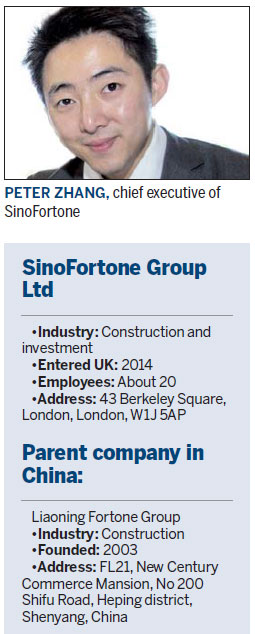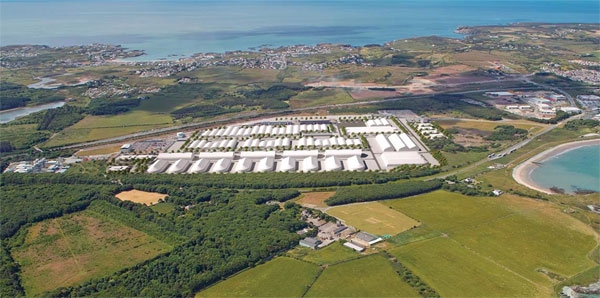SinoFortone aims to be household name in UK
Chinese now look beyond pure financial returns in efforts to move up value-added ladder
SinoFortone may not yet be household name in the UK, but the company is committing billions of pounds of investment in crucial UK infrastructure projects with a clear strategy of using the foothold to grab opportunities in Europe and along the route of China's Belt and Road Initiative.
SinoFortone first made a name for itself in the UK during President Xi Jinping's 2015 state visit by announcing an investment of 2 billion ($2.5 billion; 2.3 billion euros) in two biomass power stations in Wales, and 100 million in London's new Paramount entertainment park.
Since then, it has signed a deal with Scottish First Minister Nicola Sturgeon to lead a Chinese consortium to invest 10 billion in Scotland's infrastructure.
|
SinoFortone has invested in a renewable power plant in Anglesey, Wales. Provided to China Daily |
"We are confident about the UK's investment opportunities despite short-term Brexit uncertainties," says Peter Zhang, chief executive of SinoFortone.
"In the UK we would focus our investment strategy on renewable energy projects and social housing, as those sectors require more investment, provide desirable revenue return and have turnaround time periods that suit our investment agenda."
Although returns on infrastructure projects vary, Zhang says on average they can generate about 8 percent return on capital, which is not high compared with projects in emerging markets.
"Instead of looking for immediate financial returns, we are more concerned with building our reputation in the UK, gaining experience in this mature market and using our UK resources and enhanced brand image to grow into other international markets," Zhang says.
Sinofortone is a joint venture between Sinolinks Group and Liaoning Fortone Group. Liaoning Fortone is a private construction business in Shenyang that focuses on investment in large-scale projects and becoming a construction partner in those projects. Sinolinks is a Chinese company focusing on asset and fund management, commodity trading and mining.
Capital is one advantage it has in the UK's current infrastructure and housing investment market. Its ability to source cost-effective materials in the supply chain from China is another core advantage.
The UK's public sector strain on infrastructure capital has been exacerbated by the British public's vote to leave the European Union in June 2016, meaning the UK may no longer be eligible for valuable European infrastructure funds.

The UK may lose eligibility for the so-called Juncker Plan, which aims to unlock 315 billion euros ($334 billion; 270 billion) of infrastructure investment between 2015 and 2017. Currently, the plan includes eight major UK projects worth a total of 8.2 billion euros, which could create more than 70,000 jobs. Whether the funding continues will depend on the UK-EU exit negotiations.
In that context, the British government is eager to attract Chinese funds. During the eighth Economic and Finance Dialogue in London in November, it showcased 13 projects offering more than 5 billion in investment opportunities to Chinese investors.
Concerns emerged after China General Nuclear finally inked its agreement to invest in the UK's Hinkley Nuclear power station in October and the new British government led by Prime Minister Theresa May announced new rules for scrutinizing foreign investment in infrastructure projects that involve national security, but Zhang is not worried.
"Our investment mostly focuses on renewable energy, like wind, solar, waste-to-energy and biomass, which have no national security concerns, unlike nuclear," Zhang says.
In addition to capital investment, SinoFortone also helps European projects become more cost effective through sourcing equipment from China, which could cut material costs 30 to 50 percent, Zhang says.
The two biomass power stations will generate up to 299 megawatts of power each, and will be built using technology from British partner Orthios Eco Parks, which developed the innovative technology to create electricity from plants.
So far in 2016 Orthios and Zhang's team have raised 30 million in the UK from bond issuance, which is already invested in the initial phases of the power station.

Currently, factory construction does not have a timeline, as it is waiting for the UK government's Contract for Difference auction - an energy subsidy allocation process, which was delayed by the Brexit vote from 2016 to spring 2017. It is a standard process wherein the government subsidizes the price difference between what consumers pay and what power companies charge to make their investment profitable.
"Once we start construction, the power station can become operational in two years," Zhang says. Construction for the second biomass power station in Wales, in Port Talbot, will begin once the Anglesey power plant is complete.
Despite the Anglesey delay, SinoFortone's involvement in renewable energy has secured it opportunities to negotiate deals with various governments for infrastructure investment, including Kazakhstan, Greece, Georgia, Angola, Guinea and Pakistan.
"Securing the UK renewable energy deals helped us establish a good reputation and greatly helped push forward those deals in Africa and in the Belt and Road countries, where we could also play a role in bringing advanced UK technology," Zhang says.
SinoFortone's investment in the two biomass plants is welcomed by Orthios, though the fact that the technology was unproven in the market had made fundraising difficult.
Orthios was founded over a decade ago by Sean McCormick, an architect, and Lewis LeVasseur, an engineer. Orthios had already secured planning permission and relevant approvals before SinoFortone joined the project.
"We have spent five years researching and developing this model, and the investment from China will help us roll it out across the planet," says McCormick, chief executive of Orthios.
China's focus on green energy and its ability to take a long-term view was instrumental in securing the deal, McCormick says, adding that the two biomass plants combined will create 1,000 full-time jobs, as well as thousands of jobs during the construction phase.
Industry analysts see the collaboration as a win-win for both the Chinese and British sides. Danae Kyriakopoulou, head of research at the Official Monetary and Financial Institutions Forum, a London-based think tank, says SinoFortone's investment in Wales is an important example of how China is increasingly using its resources to invest in high-innovation, knowledge-driven economies.
"Appropriately for an economy in the phase of industrialization, China has traditionally focused its investment on resource-rich economies that have in exchange provided it with the raw materials it needed to fuel its development," Kyriakopoulou says.
"However, China is now looking beyond the purely financial returns on investment as it seeks to move up the ladder in the global chain of value-added."
In March, SinoFortone led a Chinese consortium to sign an agreement with the Scottish government to invest 10 billion in Scotland's infrastructure, covering projects in transportation, power stations and social housing. China Railway No 3 Engineering Group is also part of the consortium and is expected to provide technical support.
"We saw market demand in Scotland for those new infrastructure projects, so we wanted to help the Scottish government fulfill those demands," Zhang says. "Our advantage in engaging with those projects is our capital investment and our ability to bring Chinese elements."
One example of Chinese construction techniques to be deployed in Scotland is prefabricated modular housing, which could be 30 percent more cost effective than on-site construction.
In addition to infrastructure projects, SinoFortone is also increasingly engaging with the UK's tourism market, riding an increasing number of Chinese visitors.
In December it purchased The Plough at Cadsden, the pub in rural Buckinghamshire where then-prime minister David Cameron treated President Xi Jinping to fish and chips and a pint of beer in 2015.
cecily.liu@mail.chinadailyuk.com
(China Daily European Weekly 01/20/2017 page30)























